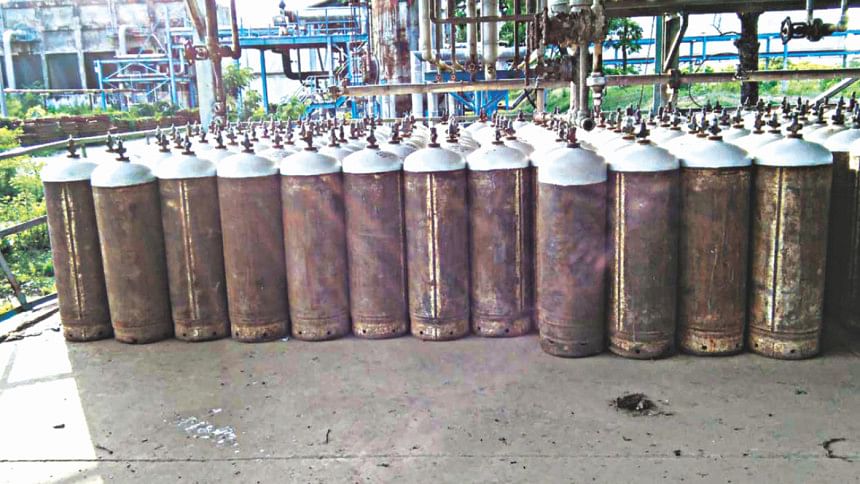Ammonia crisis hits factories hard

Factories reliant on ammonia have been hit hard since August 21 when the biggest supplier of the gas Jamuna Fertiliser Company stopped its delivery after a team of the Anti-Corruption Commission found anomalies in the gas distribution system.
Jamuna meets 95 percent of the countrywide demand of ammonia, which is used to make fertiliser, household cleaning solutions, plastics, textiles and pesticides and dyes, industry insiders said.
Jamuna started urea production at Sarishabari upazila in Jamalpur in 1991 and began selling its surplus ammonia, which is also the state-run company's intermediate product, in 2014.
The anti-graft watchdog found that the fertiliser company was delivering ammonia cylinders among dealers violating rules.
At least 35 export-oriented fish processing industries, mostly shrimp, in Khulna, Chittagong and Dhaka divisions that rely on the gas to run their refrigeration system are facing serious troubles now.
The crisis is now forcing cold storages in Munshiganj and milk factories in Sirajganj's Baghabari, Dhaka's Mirpur and Faridpur's Tekerhat to consume more electricity to keep the refrigeration system running.
Five glass factories and 10 latex industries are now in dire need of ammonia as they in no way can go for manufacturing without the gas.
Ice factories which use ammonia to preserve Hilsa and other sea fishes may have to bear the brunt if the gas shortage persists after October 22 when the ban on fish catching ends.
There is a monthly demand of 6,000 to 7,000 cylinders filled with 50kg liquid ammonia in peak season and 3,000 to 3,500 cylinders in off-peak season, according to Zakir Hossain, general manager for commercial at Jamuna Fertiliser.
The company used to have as much as 11 to 12 tonnes of surplus ammonia a day— enough to fill up 220 to 240 cylinders—after reaching its urea production target.
The factory has a capacity to fill up 120-170 cylinders, which it used to sell to the dealers at Tk 2,000 each before August 21, said Mahbubul Alam, deputy manager for commercial at Jamuna Fertiliser.
Rezaul Haque, managing director of Modern Seafood Industries Ltd in Khulna and a director of Bangladesh Frozen Foods Exporters Association, said his factories require 30 to 40 cylinders of ammonia a month. The country has around 35 frozen foods exporters, each of which require 15-20 cylinders of ammonia a month to survive, he said. “But we are not getting the gas from the dealers after the suspension of delivery. Now our reserve is about to finish.”
Haque said shrimp worth Tk 100 crore of the industries is set to be exported. “If the refrigeration system fails due to the lack of ammonia, the processed fish will lose its quality. If the situation prolongs, we will incur huge losses.”
Nasir Glass Industries Ltd, which meets 80 percent of internal demand, has cut production by 30 percent due to the ammonia crisis, said Ahmed Faruk Siddiki, general manager for operation of the company.
Nasir Glass produces nearly 300 tonnes of glass using 600kg of ammonia. “The crisis is going to deepen as we are not getting the gas from anywhere in Bangladesh. If Jamuna does not supply the gas, glass makers will have to import ammonia for survival.”
Al Amin Hossain, owner of Green Trust Latex Industry Ltd in Moulvibazar and general secretary of the Bangladesh Concentrated Latex Manufacturing Association, said the sector meets the entire domestic demand.
But now the dearth of gas has appeared as a severe threat to the latex industry, Hossain said. Khan Jabed Anwar, managing director of Jamuna Fertiliser, said the factory would not be able to put up ammonia for sale until it gets the desired pressure of natural gas.
“We are already running operations with a much lower gas pressure.”

 For all latest news, follow The Daily Star's Google News channel.
For all latest news, follow The Daily Star's Google News channel. 



Comments